Volunteering at Elephant Nature Park: What’s It Like?
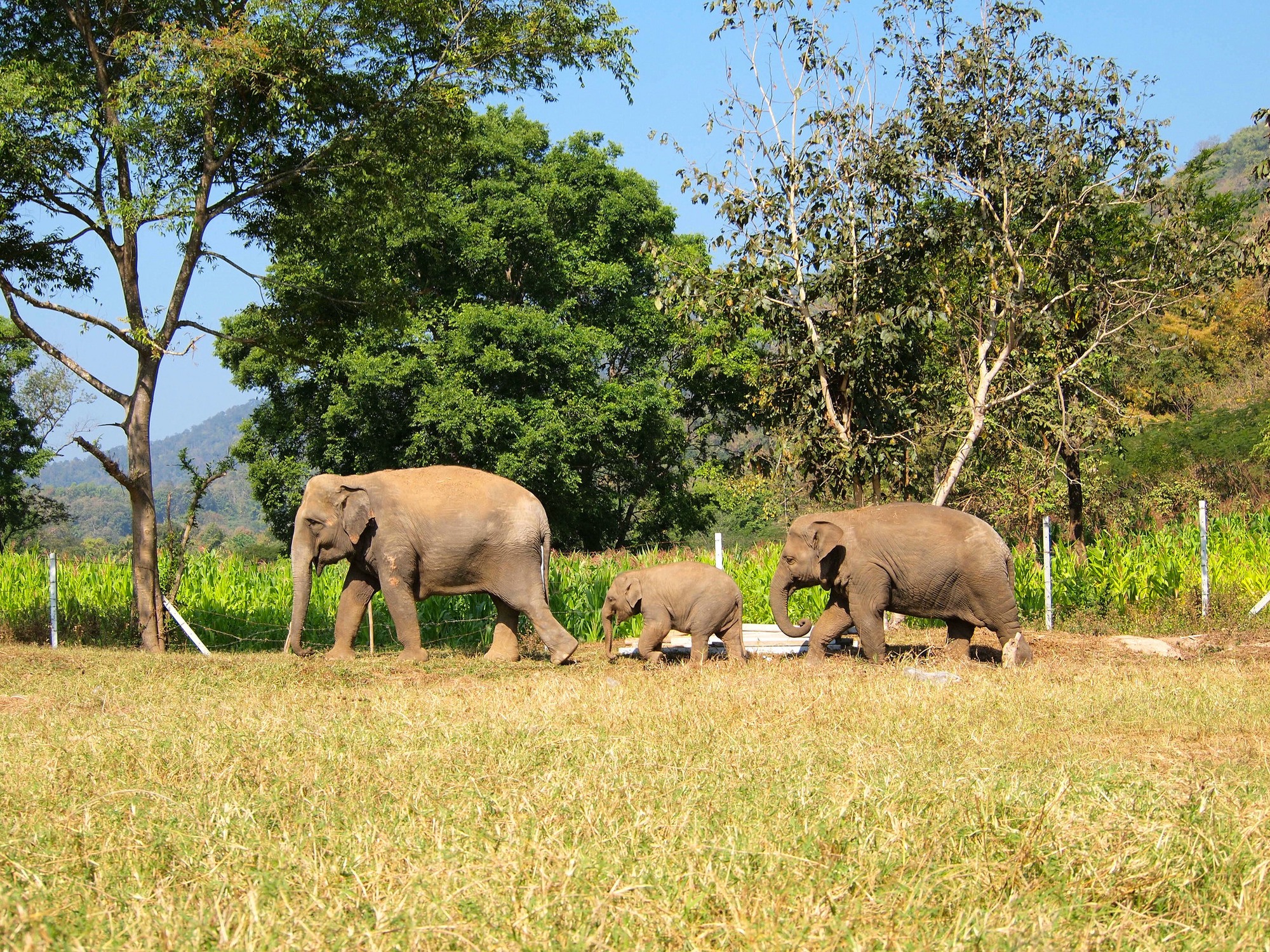
This post was written after a volunteering trip made in February 2014, but information on volunteering is kept as up-to-date as possible!
You may not know this, but I planned my entire Southeast Asia trip around doing one thing: volunteering at an elephant sanctuary.
Ever since I first heard of Elephant Nature Park — a sanctuary for injured and abused elephants in northern Thailand — a few years ago, I put “volunteering with elephants” high up on my bucket list. I knew about the plight of the Asian elephant, and I also knew what Elephant Nature Park was doing to try to combat it. Of all the elephant parks in Thailand I could have gone to, THIS was the only one I felt confident about — I knew my time and money would do good here.
And so, when I decided to go to Asia earlier this year, spending time at ENP was the focus of my entire trip.
Elephant Nature Park offers a variety of options to visit and spend time at the park, including a volunteer program where people can spend anywhere from 1 to 4 weeks living and working with the elephants.
RELATED: Get to Know Elephant Nature Park
I applied in November for a 1-week volunteer stint in February (spots can fill up quickly, especially during high season!), and heard back within about a day that I had been accepted. I then paid a deposit, and began planning the rest of my Asia trip around that one week.
One thing I have found is that, though there's a TON of information on the internet about Elephant Nature Park and the great things it does, there isn't a whole lot of detailed information about the volunteer program itself.
So that's where I come in! Below are some questions I personally had about the program (and some that others have since emailed to me), and my answers to them after being an ENP volunteer myself.
Volunteering at Elephant Nature Park FAQ
What will you do at ENP?
The biggest question, of course, is what do you DO as a volunteer at an elephant sanctuary?
The number of volunteers at ENP each week can range anywhere from about 40 to 80 people. After you arrive at the park and get settled in, you'll be placed into one of 4 lettered groups (A, B, C, D). This group will be your work group for the duration of the week.
There are a variety of chores and tasks to be completed at the park each day, and a whiteboard at the “Meeting Point” is updated each morning with information on what each group will be doing when.
There are two “work” periods during the day: one immediately following breakfast, and one after lunch. The morning work period begins between 8 and 8:30 a.m. (breakfast is served promptly at 7 a.m. each morning), and the afternoon work session usually starts around 1 p.m., after lunch. You usually will work for 1-2 hours during each work period.
Work period jobs include things like:
- Scooping elephant poo (morning job) — Armed with pitchforks and wheelbarrows, your group has to clean up the overnight mess in all the elephant sleeping enclosures.
- Banana tree cutting (morning job) — You'll be put into the back of a utility truck and driven about 45 minutes away to cut down banana trees and load them into a truck.
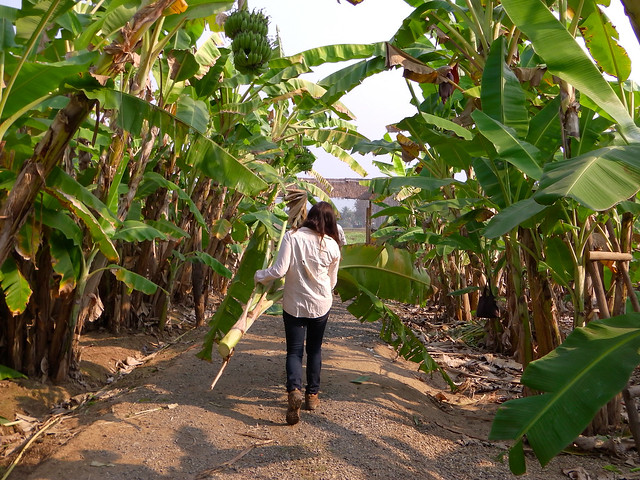
- Preparing elephant food (morning or afternoon job) — Basically cutting fruits/vegetables in the “elephant kitchen” and sometimes delivering food to the mahouts or elephants.
- Banana tree cutting (afternoon job) — The afternoon version of this job entails chopping the trees a group cut down in the morning into bite-sized pieces, and peeling the bark off them.
- Garden pole building (afternoon job) — You gather stones from the river, mix cement, and work on stone “fences” to protect trees and other areas that the park doesn't want the elephants to get too close to.
- Bamboo washing (afternoon job) — Rinsing off bamboo in the river.
- Grass/corn cutting (all-day job) — Every group will get assigned this task once, and it's definitely the most dreaded assignment among volunteers. You are loaded into a utility truck, driven about 40-60 minutes away from the park, and deposited in a field of grass or corn that needs to be cut down with machetes. You spend the next few hours cutting and baling grass or corn stalks. You then have lunch in the field, and then load the truck back up with everything you've baled. The good news? On the day you have this job, you get the afternoon off. The bad news? You aren't done until the truck is full, so these jobs take a while and are an exception to the “working for 1-2 hours at once” rule.

- Random jobs (anytime) — You may also have to do things like unload trucks of donated food, or load bales of hay to deliver to elephants across the river. Your volunteer coordinators will stress that any work assignment can change at any time based on what needs to be done the most.
One work period during your weeklong stay will be an “Ele Walk,” where the volunteer coordinators will walk you around the whole park and tell you stories about the elephants. This is always a favorite!
And around 4 p.m. each afternoon is bath time for many of the elephants. All the volunteers take part in this on Orientation Day, and then you have the option of participating the rest of the time you're at the park.
(NOTE: As ENP has evolved, they've taken a more hands-off approach to caring for the elephants, in order to make sure the animals aren't getting overwhelmed by too much human attention. Bathing the elephants may not be an activity you can participate in anymore.)
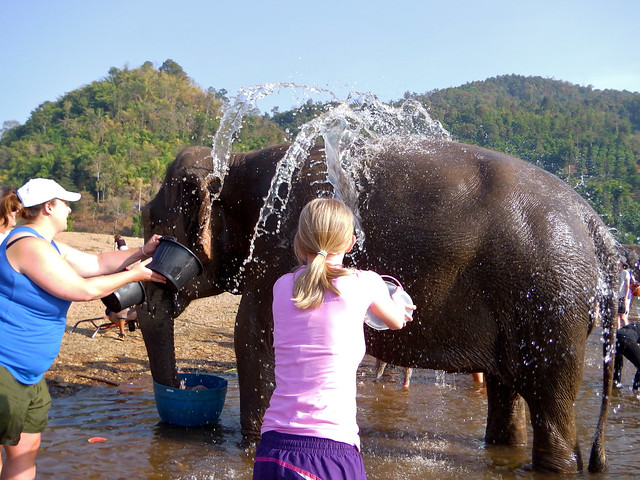
What can you do for fun?
Even though you spend a good portion of the day working at Elephant Nature Park, you'll find that you have plenty of downtime, too.
In the afternoon (especially if you have the work period off after grass/corn cutting), you can talk to the volunteer coordinators about going tubing down the river that runs through the park. They will load you into a truck with a bunch of inner tubes, drive you a few kilometers up the road, and then deposit you in the river. You then float back to the park — it's a lot of fun!
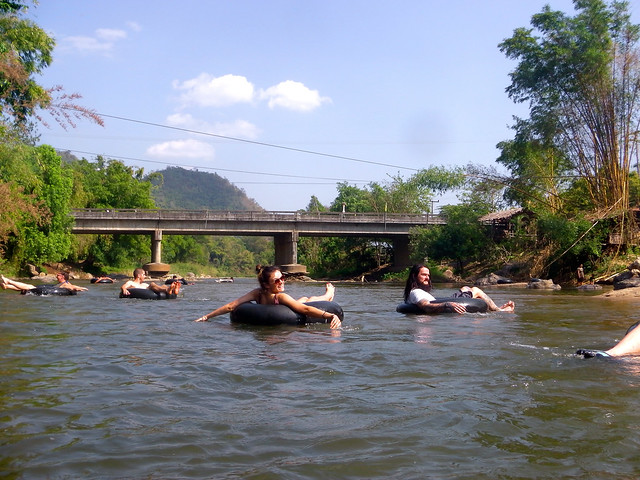
You can also hang out at the viewing platform or skywalk to watch the elephants or simply curl up with a good book (I did this almost every afternoon).

Another free-time option is to go help out at ENP's dog sanctuary. In 2011, when Bangkok and Chiang Mai were subjected to severe flooding, Lek and her team rescued about 400 dogs that owners had abandoned as they fled their homes.
There is a dog volunteer program at ENP, too, but there are never enough dog volunteers, so they will always welcome extra hands to walk the pups or just give them some attention.
In the evenings, the ENP staff will often coordinate an activity — for example, we had a blessing ceremony on our first night, an “elephant gossip session” with resident elephant expert Jodi, a Q&A session with ENP founder Lek, a Thai culture lesson, and a special farewell dinner with traditional music and dancing on our last night at the park.
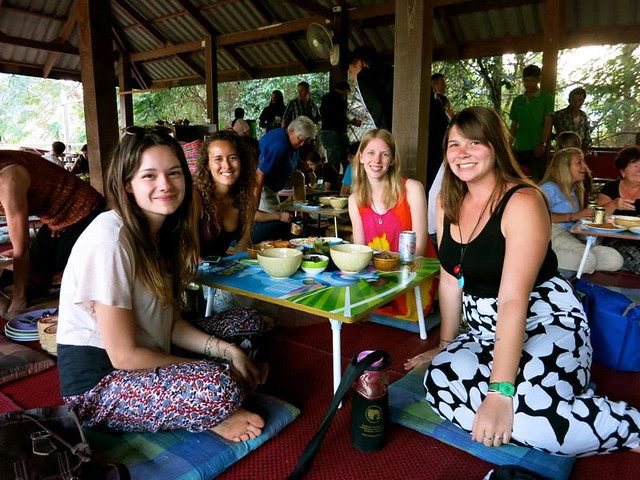
Later in the evening (like, after dinner), a lot of the volunteers in my group would wander up to a little convenience store in the local village to buy beers and snacks. We would sometimes stay there and turn the shop into a “pub,” and other times would go back to ENP to hang out on the viewing platform.
Just keep in mind that “quiet time” kicks in at 10 p.m., and this really isn't the place to get your party on.
There are also massages offered by women from the local village on the top floor of the platform for really great prices. These are also a popular evening activity!
Note: Elephant rides are NOT offered at Elephant Nature Park — elephants are not actually built for riding, and it's actually kind of cruel.
RELATED: Please Don't Ride the Elephants
How much do you interact with the elephants?
This is first and foremost a volunteer opportunity where you spend a lot of time doing tasks to *help* the elephants. But that doesn't mean that you don't get to interact with the animals on a daily basis.
You may have the opportunity to help bathe and feed the elephants each day, and of course you can watch them in their daily interactions.
At least once during your stay you'll also get to go on a “Ele Walk,” where you'll see many of the elephants up close and get to know their stories.
There's NO elephant riding at ENP, and you also won't spend a ton of time touching or walking around with the elephants. The elephants at ENP have been allowed to form their own family groups and routines, and the goal of the volunteer program (and, really, everything that goes on at the park) is to make it as easy as possible for the elephants to live as “normal” a life as possible.
This means that you won't be interacting with them 1-on-1 very often, since that would not happen if they were living in the wild.
What is the accommodation like at Elephant Nature Park?
Accommodations are provided in cabins, with usually 2-3 volunteers per cabin. You get a twin-sized bed with blankets and a mosquito net, and each room has a dedicated toilet and shower usually right across a hallway.
I was actually pleasantly surprised by the cabins — they were rustic, sure, but they were more comfortable than I had been expecting.
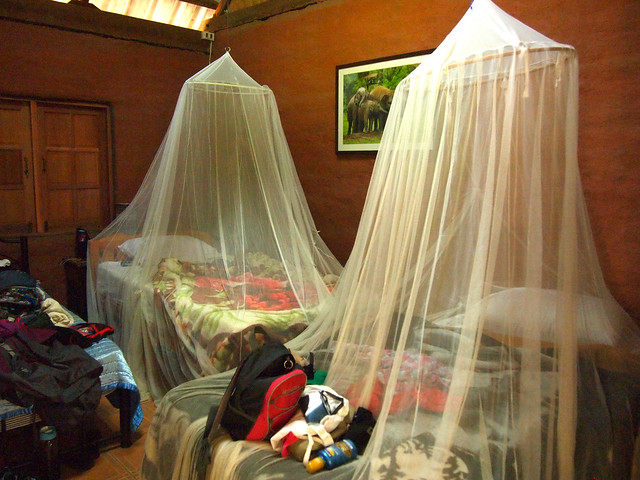
The showers are kind of hit-or-miss when it comes to hot water, but a mention of water running cold to the volunteer coordinators usually had the problem fixed within a few hours.
If you're traveling with someone (be it a friend or significant other), you can get a cabin together. If you're traveling solo, you'll be assigned to a room with either one or two other volunteers of the same gender as you.
There aren't safes in the rooms, so if you're traveling with any valuables it might be a good idea to invest in something that will help keep your things safe. I recommend this portable safe by Pacsafe, which you can secure to anything that's bolted down.
What are meals like at ENP?
Elephant Nature Park serves 3 meals a day: breakfast a 7 a.m., lunch at 11:30 a.m., and dinner at 6 p.m.
All the food at ENP is vegetarian. Don't let this worry you if you're not vegetarian, however. Each meal includes SO MANY different options that there is never any worry of going hungry. Even if you don't love tofu, there are always noodles, veggies, rice, and even french fries to fill your belly with.
Water, tea, and coffee are all provided, and you can buy soft drinks for 20 baht (about 60 cents USD). There is sometimes also a little snack stand open near the skywalk where you can buy snacks (like chips and chocolate).
What should you pack for Elephant Nature Park?
Everyone will be different, of course, but here are a few things I would highly recommend bringing with you:
- Clothes you don't care about — Some of the jobs can get you quite dirty; don't bring your nicest duds to work in. Most volunteers wear shorts and tank tops/t-shirts, though keep conservative Thai customs in mind when you're packing (i.e. no booty shorts or tube tops, please!). I actually bought some cheap shorts and t-shirts at a market before my week at ENP, and then donated them to the park afterwards (they take a lot of the donated clothes to nearby hill tribe villages).
- Long pants and long sleeves — It can get CHILLY here up in the mountains in the evenings. You'll also want to have a long layer for grass/corn cutting day to protect your arms and legs from itchy cuts and scratches.
- Closed-toe shoes — You won't want to be wearing flip-flops for some of the chores. Instead of trainers, I decided to get a pair of Keen Whisper sandals. They have a closed toe, but still let my feet breathe!
- Sunscreen/a hat — You will definitely need it!
- Insect repellant — You will also definitely need this! Get the DEET-heavy stuff (you know, the stuff that's illegal in many countries). During the day you will get bitten by flies, and at night the mosquitoes will come out to feast on you.
- A torch/headlamp — After dark you'll want a light of some sort to help you get around (like, from the platform to your cabin or vice versa), and a headlamp is always a great bet.
- Earplugs — Elephants can be noisy. And so can the 400+ rescued dogs who call ENP home. If one of them starts barking at midnight, ALL of them start barking at midnight. So be sure to pack some good earplugs.
- A towel — You can rent one from the park (usually just old ones that previous volunteers have donated/left behind), but it's easier if you can bring your own. I recommend a quick-drying microfiber towel!
- A sleep sheet — If you want an extra layer of warmth (or just an extra layer between you and the sheets if you're that type of person), I always travel in Asia with a silk sleep sheet. The silk is light and easy to pack, too, which is an added bonus.
The park provides laundry service (60 baht per kilo), so don't worry about bringing multiple outfits for each day. You'll also be given a reusable water bottle and over-the-shoulder sling bag to keep it in on Orientation Day, which is very handy to take around with you while you're working.
Is there wifi at ENP?
Yes and no. Technically there IS wifi at the park, but it is down more often than it is working. We had no wifi the entire week I was there. The staff was nice enough to set up a wired laptop in the evenings, though, for anyone who needed to send a message home.
If you want to be able to keep in touch with people back home while you're at Elephant Nature Park, you'll need an unlocked smartphone. Then you can buy a DTAC Happy SIM card. This is the ONLY SIM CARD THAT WORKS well in this part of Thailand, however. So don't get a SIM from AIS or any other Thai carrier, because chances are you will have no signal.
I had a DTAC card (I think I paid around $20 USD for the SIM and 6 GB of data), and had strong signal at all times at ENP.
How much does volunteering at Elephant Nature Park cost?
The volunteer program at Elephant Nature Park provides an important revenue stream for the park. So, yes, it's a pay-to-play type of experience. All of your money goes to running the park and it's projects, however, so you know it's going to a good cause.
One week of volunteering costs 12,000 baht (about $365 USD in 2018). This includes transport to/from the park (from Chiang Mai), your accommodation, and all your meals for the entire week. You'll also get a volunteer t-shirt on your first day.
Is this good for a solo traveler / couple / family?
After writing this post, I received quite a few emails from all sorts of different types of travelers asking if I thought this volunteer experience was right for them. And my answer is almost always YES.
I volunteered as a solo traveler – and I think the majority of volunteers are solo travelers, simply because Thailand is a really popular place for this type of travel. But there were couples, too, and small groups of friends. There were no families volunteering when I was there, but I think this could be a fantastic way for a family to bond and make some really cool memories.
If you're traveling solo, you'll be paired up with another volunteer or two in a cabin. If you're traveling as a couple or family, though, you will likely get your own room.
Am I too old / young to volunteer at ENP?
Nope, you're probably not. Children 12 and older are welcome at ENP with a parent/guardian, and there's no maximum age for volunteers. We had two men above 60 volunteering when I was there. As long as you're willing to pitch in with the work, ENP would be happy to have you.
What else should you know?
First of all, know that the volunteer program at ENP is extremely popular, especially during high season (Nov.-Feb.). If you want to volunteer at the park during this time, be sure to book well in advance! (Like, months or even a year in advance.)
You should also know that a volunteer week begins on Monday at 9 a.m. at the ENP office in Chiang Mai, Thailand. This is where you sign in, pay any balance you owe, and get your t-shirt. From there, you are taken by mini bus to Elephant Nature Park for your Orientation Day.
Your week ends at 3/3:30 p.m. Sunday, and the same mini buses will take you back to Chiang Mai and drop you off anywhere within the Old Town.
If you are volunteering for more than one week, you can either stay at the park on Sunday night, or book a hostel/hotel for the night in Chiang Mai if you want to go into the city for the night market or just to hang out with new friends.
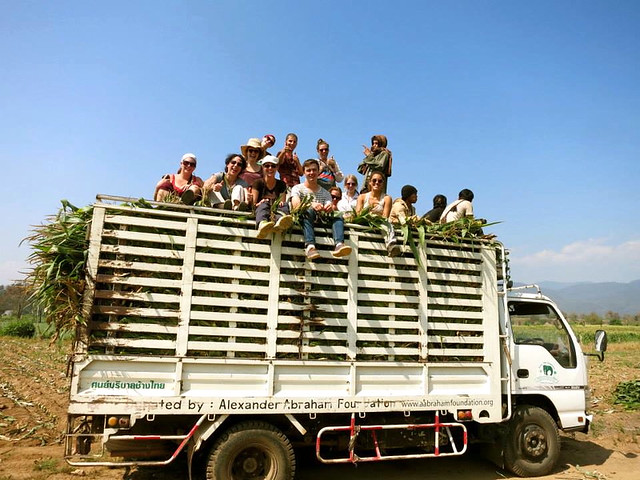
Where should I stay in Chiang Mai?
Most volunteers arrive in Chiang Mai on the Sunday before their volunteer week starts. Some guesthouses close to the Elephant Nature Park office (meaning you won't have very far to walk to catch your ride to the park the next morning) include Somwang Boutique Hotel, Lost in Chiang Mai Guesthouse, and Yin Yang Guesthouse. All of these are very central and close to other noteworthy sites in Chiang Mai, too.
After my week of volunteering, I went back to Chiang Mai for four days and decided to splash out on a slightly fancier place. I stayed at The Twenty Lodge on the other side of the Old Town, and really liked that, too. (Read reviews | Book here)
Or, check out reviews for other hotels in Chiang Mai here.
Would I recommend volunteering at Elephant Nature Park?
YES. Yes, yes, yes a thousand times over. My week at Elephant Nature Park was one of the most memorable and rewarding travel experiences I've had thus far.
The people you will meet — the volunteers, the ENP staff — are incredible, the elephants are beautiful and worth getting to know, and the park's setting is beautiful and relaxing.
I'm happy to have been able to support such a great place, and I would definitely do it again.
How can you book?
You can apply to be an elephant volunteer online:
Read about being a weekly volunteer and book here.
Want to help but don't want to volunteer? Click here.
Read these other posts about Elephant Nature Park:
Do you have any other questions about volunteering at ENP?
Pin it for later:

Amanda Williams is the award-winning blogger behind A Dangerous Business Travel Blog. She has traveled to more than 60 countries on 6 continents from her home base in Ohio, specializing in experiential and thoughtful travel through the US, Europe, and rest of the world. Amanda only shares tips based on her personal experiences and places she's actually traveled!

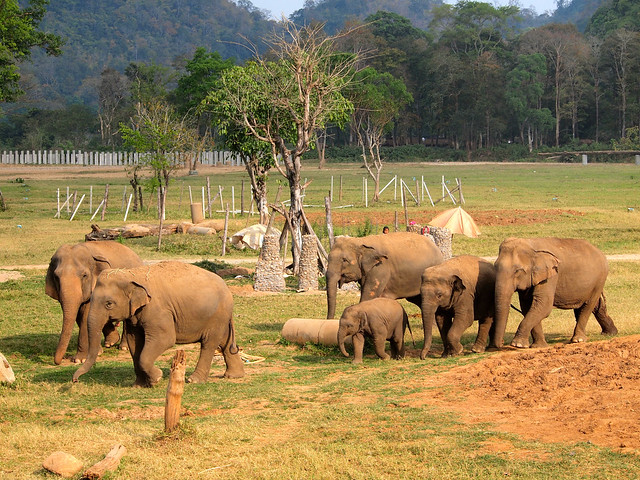
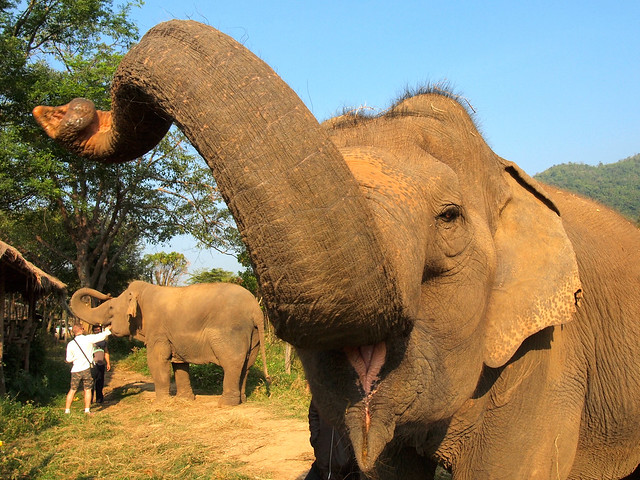
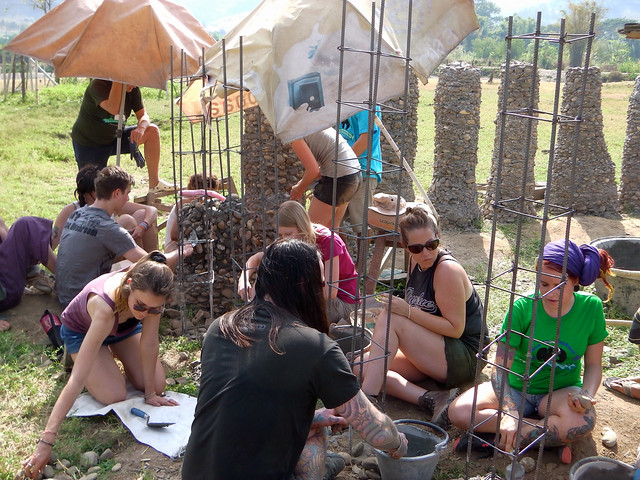
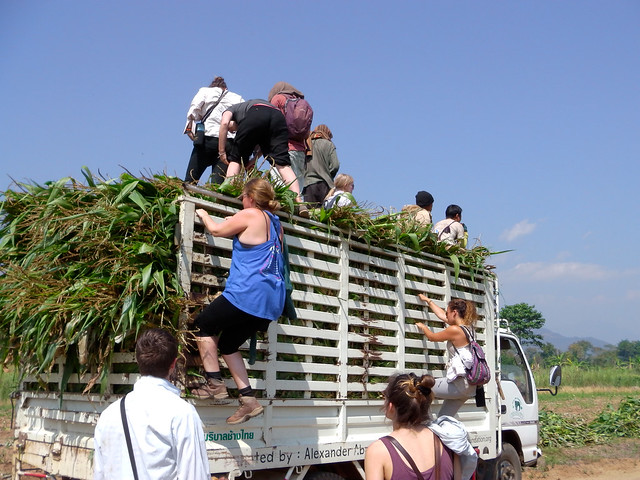
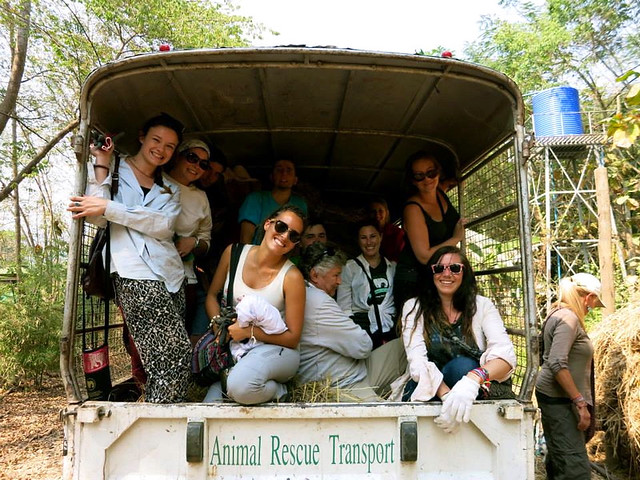

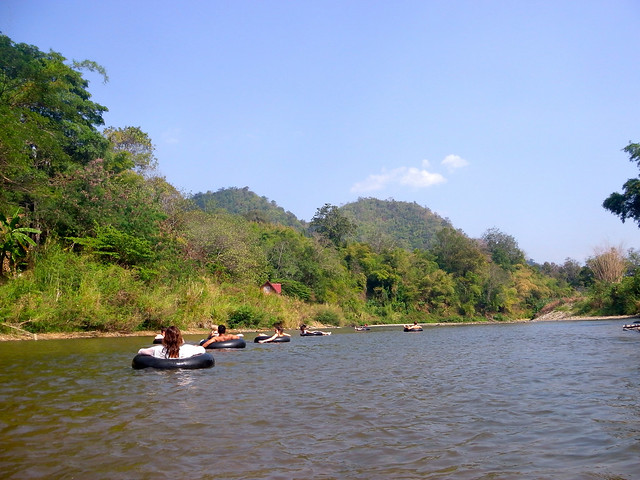
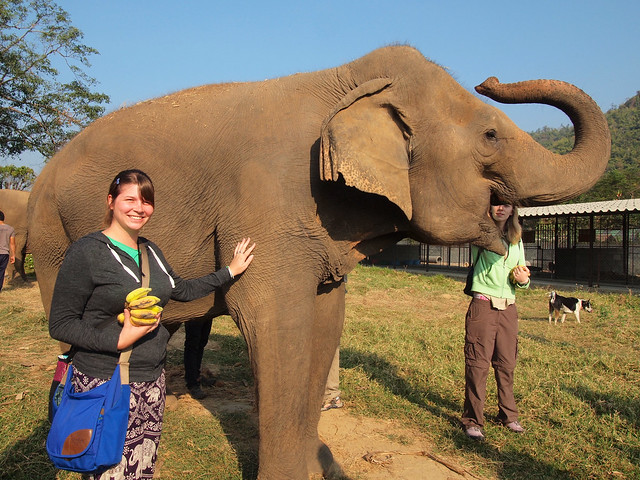
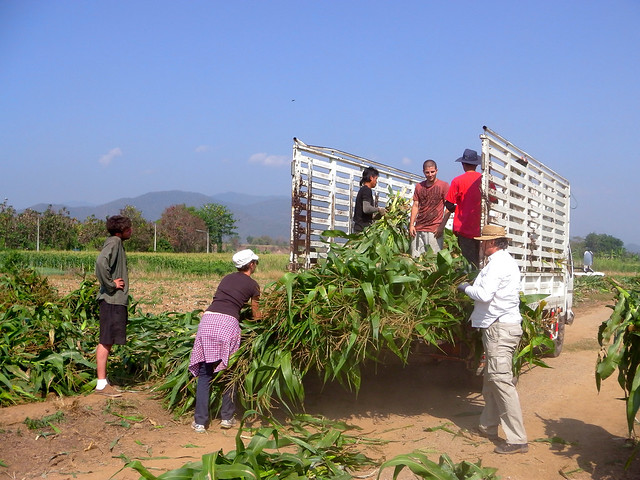
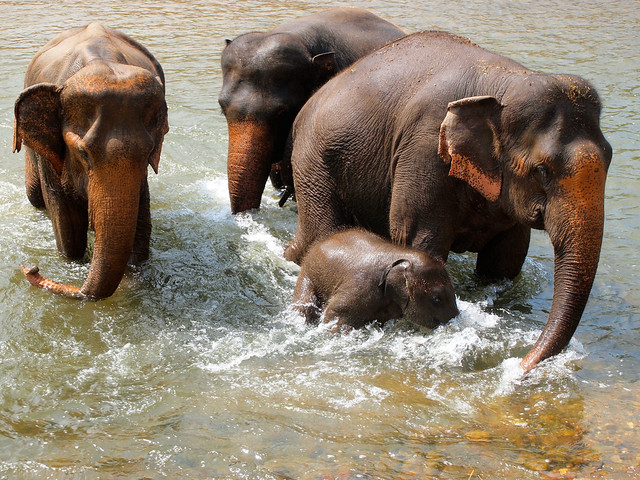
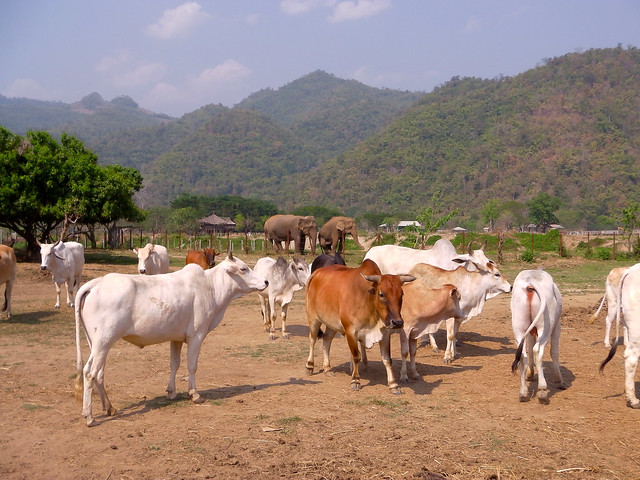
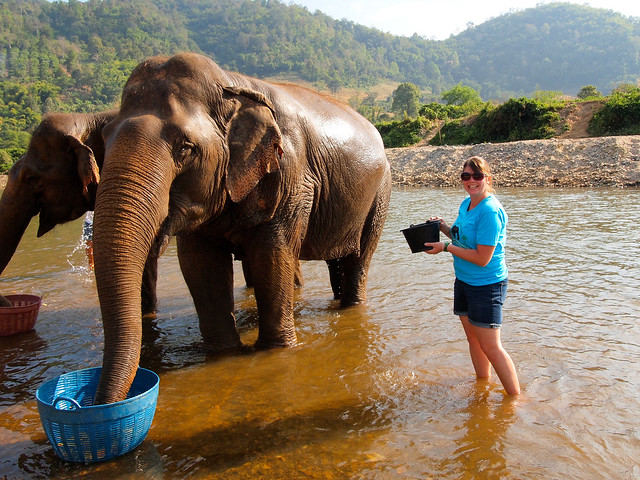
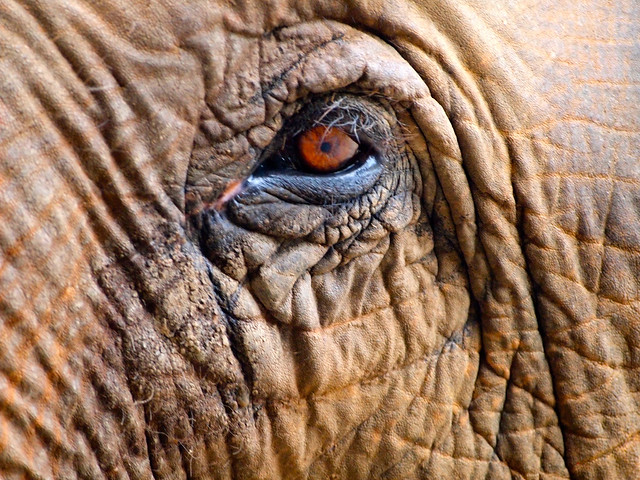
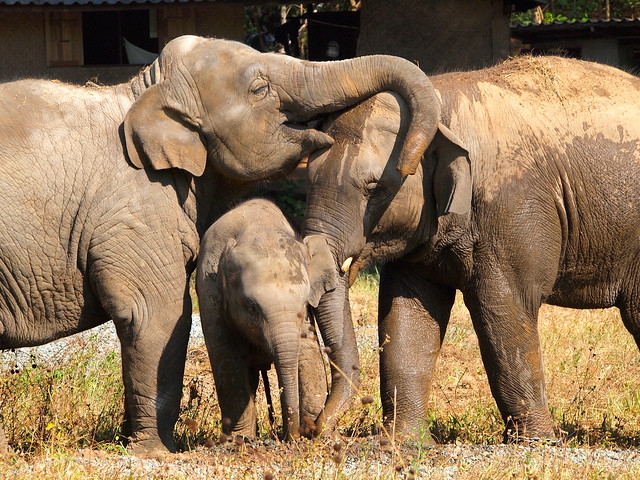
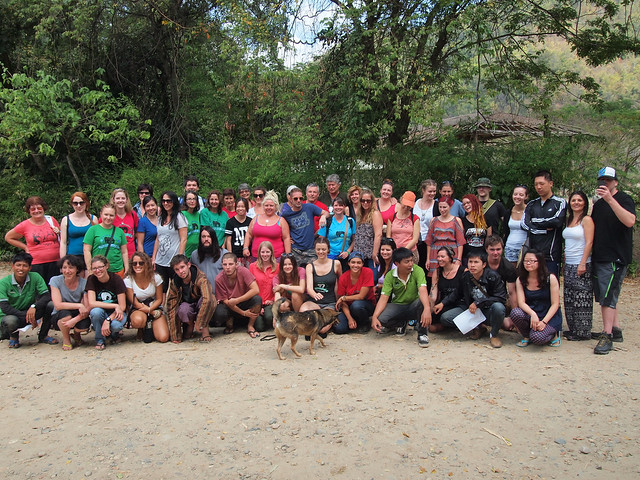









Hey Amanda, my bf and I are considering doing this week volunteering experience in a couple weeks. He is nervous/kinda grossed out about the shovelling poo tasks…is it pretty crazy or made up for by the awesome experience? Also do you know of any other similar “volun-tourism” experiences in Thailand or Laos? Thanks for your help!
Haha, poo duty really isn’t that bad! Elephants mostly eat grasses and fruit anyway. And you usually only get put on poo cleanup once in the entire week. So yes, I would say the rest definitely makes up for it! The work you do IS hard at times, but it never lasts long and all the rest is so great.
I haven’t done any other volunteering in Asia. And I would be careful about other experiences that involve animals or people – not all of them are legit, and sometimes you could actually be hurting more than helping! ENP is definitely a good bet, though.
Wow this is such a cool opportunity! Thanks for posting and sharing your experience! Is there an age minimum? Is this something I could do with my 14 yr old son? I’m considering “worldschooling” him next school year. I want to find volunteer work (with minimal costs), cultural activities, and small paid jobs even that are completely different than anything in Minnesota! Haha doesn’t take much. Anything else you recommend I check out?
Hey Kristin! They recommend kids be at least 12 (and of course younger kids require a parent/guardian to volunteer with them). So yes, this would definitely be something you could do with your son! It’s a great volunteer experience. You can also volunteer with their dog rescue center (located in the same place as the elephant program). I know quite a few people who would volunteer with the elephants for a week, and then spend a week or two volunteering with the dogs.
Do you think this kind of volunteer project would be good with a spouse? I really want to do it (and bring along my husband!) but do you think it will be awkward? Are most of the people solo/young travelers?
It won’t be awkward at all! There were quite a few couples there the week I was volunteering. I’m pretty sure if you go with a spouse you can get a room/cabin to yourselves. 🙂
Thank you so much for writing this detailed account. It was VERY helpful. I’ve wanted to volunteer at ENP for years, but am waiting until my youngest is old enough to go with me. Were there any teens in your group?
Thanks!
So glad you found it helpful! That’s exactly why I wrote it. 🙂
I don’t think there were any teens in our group, but this would be a fantastic experience for a teenager!
Thanks for all of this info! I am a single woman traveling alone for the first time outside of the US. I, like the rest of the volunteers, love elephants. I am so excited for this trip! But also like some of the commenters on this page, I do have some apprehension about traveling to a foreign country alone and getting around. I am curious if anyone plans on staying in the city on Sunday night before the park? I would love to connect with other travelers who may be going at the same time as me… the first two weeks of May 2015?
Glad you found this post helpful! And don’t be too nervous – Thailand is quite tourist-friendly!
Hey Katie!
I have the week booked starting the 4th May! Is that when you’re going? I will be arriving the day before in Chiang Mai. I have been to Chiang Mai once before and was going to try book the place I stayed last time (I can’t remember the name). I’d love to meet up! And I can let you know where I’m staying once I figure what it was called!
Also thank you Amanda for your great post! Very helpful!
Excellent post, thorough and informative. I would love to do this. I do have one question for you. In all the photos, it looks like most of the volunteers are fairly young. Were there any volunteers there who were “older” travelers? I’m healthy and strong and not worried about being able to do the work, but the fact is I am probably old enough to be your grandmother! That is what my blog is all about, inspiring and empowering older women to travel more and do it more adventurously! I’d love to hear your take on this.
Thanks.
The volunteers definitely tend to be in the 20-30 age range, but I think part of that just has to do with the fact that it’s mostly younger people (i.e. backpackers) traveling in Thailand. There WERE people of all ages, there though! There was a group of older ladies that come back nearly every year, and they end up working on special projects of their own. There were two older men in my group, too – both in their 50s/60s.
The really fun part about ENP is that everyone is there for the same reason. So the ages don’t really matter so much since you all have a love of elephants in common! I think you should definitely do it!
Thanks for the encouragement, Amanda. I’m putting it on the list! You have made the whole experience come alive and have made me want to be part of it. Thank you!
Hi Sami! When are you traveling there if you don’t mind me asking? Also I was very concerned about the same things and what I believe I’m going to do is arrange for the hotel to pick me up from the airport on sunday and then have the ENP pick me up from the hotel on Monday morning.
Hi Amanda!
Thank you so much for writing this blog…I’ve found it incredibly helpful and have actually decided to make my first international trip to ENP! I know that Becca asked some similar questions…but I was hoping to gather a few more details from you if possible.
I will also be traveling alone, and as a young woman I am a little paranoid about my safety while maneuvering the airport/ground transportation to the park. I saw on their website (under FAQ’s) that a private vehicle can be arranged that will pick me up at the airport and transport me directly to ENP…was this something that anyone you volunteered with chose to do instead of getting a hotel the night before? Are you aware of any particular safety issues that I should be aware of?
What was your communication like with ENP leading up to your visit? I am having a hard time retrieving many details about safety, etc. from them by email or by phone…I was just curious as to how I would arrange this private transportation or have any of my other questions answer prior to my trip?
Thank you SO much for your time, I really appreciate it!!
Hey Sami! I’m afraid I don’t know of anyone booking that private transport – if you’re flying into Chiang Mai, it’s pretty easy to get safely into the city though. Just be sure to ask about the taxi price before you get in – some have set fares.
As for communication with the park, I did get confirmation emails from them, but I didn’t try asking them any additional questions. Did you try contacting them on Facebook? Maybe you’ll have better luck asking them stuff on social media!
Hi! Great blog, thank you for the helpful advice and sharing your experience! I’m currently planning a one week volunteer trip to the Elephant Nature Park and just booked for the beginning of June 2015. I was hoping you could give me some advice! I’m travelling alone and it will be my first time doing so, so I am a bit nervous. I was wondering what hotel you stayed in prior to being picked up Monday morning at the ENP office and if you had to stay in a hotel Sunday night before your flight home? I’m not nervous about being at the park, I’m incredibly excited for that, but any advice you could give me about staying in Chiang Mai after you get off the plane and before you go back home would be very helpful. I was also curious on transportation from the airport to a hotel and what that would be like. I would really, really appreciate any knowledge you could share! Thank you soo much! -Becca
Hey Becca! There are lots of guesthouses in Chiang Mai not far from the ENP office. I stayed at Smile House, a guest house less than 5 minutes from the office (http://www.smilehousechiangmai.com/). You can get a taxi from the airport, but you can also catch a songthaew, which looks like a red pickup truck with seats in the back – these are way cheaper. I got one that dropped me off more or less right at the guest house.
I stayed in Chiang Mai after my week of volunteering, so, yes, I stayed somewhere, but it wasn’t really close to the airport OR close to the center of town. I would just check booking.com or somewhere similar for hotels – if you aren’t flying out until Monday, you might want to stay in the city Sunday so you can check out the Sunday Night Market if you don’t have a chance to do so the night before your volunteer shift. 🙂
Hi! I’m heading there next week and this post was so helpful! Thank you so much! I do have one question… I’m arriving one day late which they said was okay, but I’m wondering if I’ll miss a lot? I want to be able to bathe the elephants and see the documentary and learn everything you learn in orientation. Do you know if they’ll catch me up? Thanks for your help!
Hey Courtney! You’ll miss orientation the first day (and possibly the documentary), but you won’t miss out on anything else! You can bathe the elephants just about every day, and the majority of cool stuff they plan for the volunteers won’t happen on Day 1. If you miss the documentary, they usually play it every day for the day visitors – so just ask if you can sit in on one of those!
Oh,may be yes,probably you are the same we talked on Lek support Group:),sorry for double question 🙂 ,one more thing..how many time before have i to confirm my volunteering ?,One month before it’s enough? thanks again,i will not ask nothing else :).
If you’ve already signed up, I think they ask you to re-confirm a week beforehand. Read through the information they send you when they approve your volunteer application – everything you need to know will be in there!
I absolutely loved your article. I am planning to go for march/April for about two weeks. Do you find the work too intense or a good balance?
Thanks, Harina! And the work wasn’t usually too intense – and it usually didn’t last for more than 2 hours at a time. I’m sure you’ll love it!
Thanks for that! Just another quick question about the rooming I know you have to share which is totally cool- were you paired with someone who is a similar age as you?
I’m going to book my stay by next week. Your article got me so excited!
In general, most of the volunteers were around the same age, but I’m not really sure how they assign you to rooms. You won’t share with any guys, though! I know that for sure. 🙂
Hi Amandand thanks for your informations,i have booked my 2 weeks volunteers for half February,i would want to know if once you was at the central office you can pay the balancing only in thai Bath or with credit card/bancomat too,i will arrive in Chiang Mai on Sunday in late afternoon and the banks will be closed,so i don’t know if is better if change money in thai Bhat before starting..thanks
Hey Lorenzo! I’m pretty sure they tell you to have cash to pay off your balance when you get there. I paid in Thai Baht. So yes, if you can get some ahead of time, that would be good! You should still be able to find an ATM on a Sunday, though, even if the banks are closed. Most convenience stores in the city will have them if you need to get some cash out.
Sorry to ask abother question- I’m official booking but inward curious about the bathroom situation? Do you just share with two people? And is it a traditional Thai toilet-squat toilets?
Thanks sorry to bug again
No worries! Each cabin has a bathroom across the hall, so you’ll share with 1 or 2 other volunteers. There are also shared bathrooms on the viewing platform. And nope, there are Western toilets at Elephant Nature Park – no squatters!
[…] Another respected blogger: Amanda Williams from A Dangerous Business also spent some time as a volunteer at Elephant Nature Park in Chiang Mai and she wrote about what it is like as an elephant and animal volunteer. […]
[…] exploring Bangkok, volunteering with elephants, hanging out in Chiang Mai, and doing some heavy sightseeing in Ao Nang, I was ready for a break in […]
Incredible! what an amazing experience! I would love to do this
If you ever get the chance, DO IT!